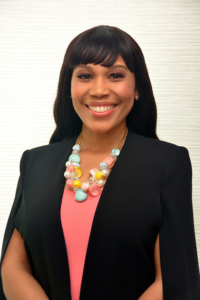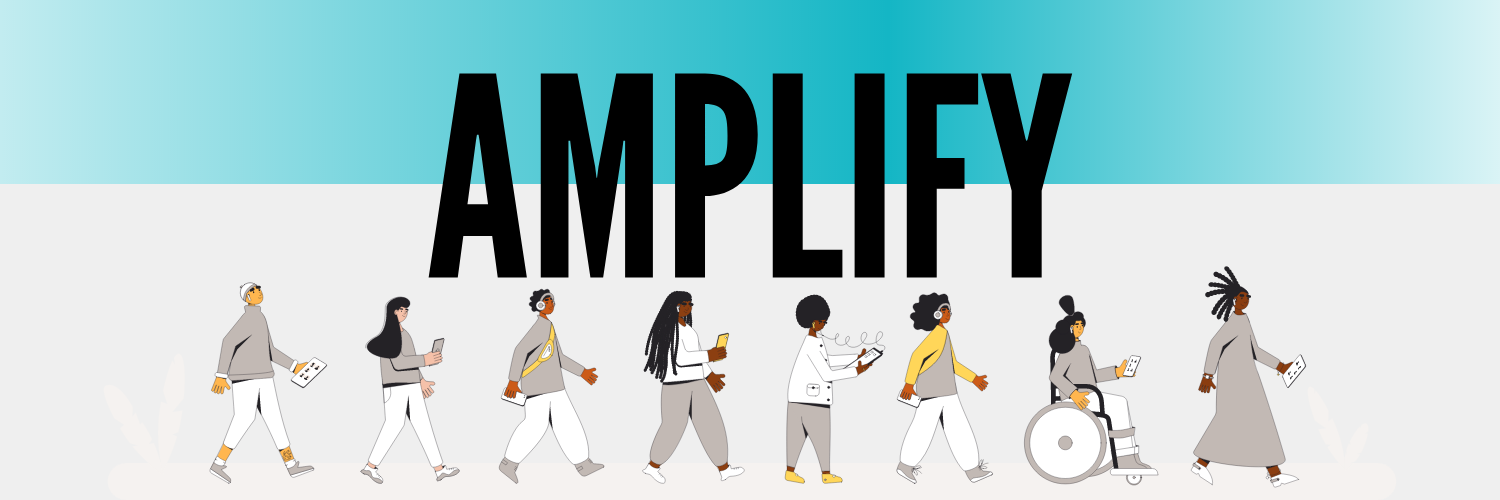
ACT | The App Association recognizes the gap in representation in the tech community, and we want to change that. Our Amplify series lifts the voices of those in the tech community who are working to close those gaps in representation. We’re highlighting the problem solvers, elevating those who are driving change in their field, and amplifying the efforts and voices of all people.
This Amplify segment highlights Qyana M. Stewart, CEO & principal consultant of member company GlobalForce Tech Consulting. At GFTC, Qyana guides her clients to success by providing innovative, cutting-edge, and secure technological solutions. From mobile to cloud-based applications, she is successfully carving out her own niche in a rapidly growing industry and doing so by upholding GFTC’s core beliefs: People. Process. Safe and Secure Products. Recently, we sat down with her to learn more about her efforts and what made the difference for her in learning how to amplify her own voice.
Q: OK, so you’ve been pretty busy as of late! Before we start getting into some of the exciting, new things on the horizon, let’s start with you! Who is Qyana M. Stewart?
A: Thanks so much for having me back. I always look forward to catching up on all the cool and exciting things happening in my world and in that of ACT | The App Association. While it’s always a little strange to talk about myself, I’m a good mix of analytical and creative. I’m also a passionate and curious innovator. As an entrepreneur, I’m always looking for ways to think outside of the box and be creative in my approaches to problem-solving. Bringing an open perspective to the world through my work helps me see the big picture and determine where I fit in it. It also helps me with balancing the structured parts of my work with the creative. I find that I am often drawing connections across a broad spectrum of ideas, concepts, and challenges and I get excited witnessing how all those things come together.
Q: And of course, this wouldn’t be a member blog without highlighting one of our APPsolutely amazing member companies. What is GlobalForce Tech Consulting?
A: In January of 2019, after five years of professional struggles in tech, I decided I had enough and quit my job as a product manager at a behavioral health software company after only six months. My voice was on mute for six years and stifled throughout my software development career, and I was desperate to explore what I could create without limitations.
My experiences, I’d later come to discover, were not unique to me but are part of a systemic culture in tech of treating women as less-than, especially women of color. I founded GlobalForce Tech Consulting, LLC, (GFTC) in 2018 while working full-time. I had one client and was generating revenue before the company even had a name. Our motto is, “People. Process. Safe and Secure Products.” We are committed to ensuring that others’ voices, those doing hard work to bring technology solutions to the most underserved, are heard loudly and clearly. GFTC helps fellow entrepreneurs, especially women, solve complex problems, change lives, and positively impact communities through the use of technology – through designing, developing, and deploying cutting-edge, innovative, safe, secure, and proven software that improves the lives of us all.
GFTC will turn three in June, and I could not be more ecstatic to bear witness to all our accomplishments during this time. In the past two years, we improved mental and behavioral health treatment access for teens and young adults by developing a behavioral health mobile app, challenged media networks to think critically about diversity, inclusion, and accessibility when developing digital products through our work with Hearst Television, and have worked with our fabulous partners at the App Association to contribute to discussions with Members of Congress about the importance of broadband access for all Americans. Every day I wake up with gratitude and excitement to go to work, and I’m so excited for what’s next in the many years to come.
I remember as a kid being told I could be anything, and I believed that. We tell children that they too can be anything, and then what happens is that society, both directly and indirectly, puts limits on what they can actually be and achieve—through race, gender, socioeconomic status—in all sorts of ways
Q: I know that mentorship is a huge part of who you are as a person and as a professional. Can you talk a little bit about your mentors when you were growing up?
A: This is an excellent question because it is such an important topic. I did not have lots of mentors growing up. I had the fortune and, I would say, the misfortune of having to navigate professional challenges and growth independently throughout my life. I had to figure things out on my own. In the end, that became a great asset and a great benefit to me as a problem-solver and eventually as a mentor. It is also absolutely one of the reasons that I am such an advocate of mentorship.
Where I lacked in mentorship, I’d say I had an abundance of support — a solid cheering section. I had family, teachers, and others who just believed in my talent and knew I could accomplish whatever I set my mind to. They didn’t see limitations for me and what I could accomplish. Having those folks as a part of my support system drove me to keep pushing and challenging myself. Knowing that there were people who had faith that I would accomplish my goals, achieve, and overcome any challenges helped me to get to where I am today. I often wonder, however, if I had a mentor, would my life have been different. I suspect I would have had a lot fewer challenges and difficulties, but it’s those trying experiences that made me a better mentor and a stronger woman.
For the past few years, I’ve had the honor of serving as a mentor-in-residence in the George Washington University Office of Innovation and Entrepreneurship. I’m always humbled by the idea that someone wants me to advise them or help them think through a specific problem. As a mentor, students regularly schedule to meet with me about any number of things – entrepreneurship, ideas for building a startup, navigating the world as a young person, or particularly as a person of color. It varies from student to student. What doesn’t vary is my ability to offer them the solid guidance they seek. I draw on my past experiences in order to help them navigate their specific challenge. The importance of connecting with students and helping budding entrepreneurs and, of course, women in tech navigate their challenges through my lived experience is a huge inspiration and motivator for me to continue doing what I’m doing.
Q: Absolutely! I see why mentorship is so important to you. The points you made really speak to the overall importance of mentorship and also are a great segue for my next question: How has mentorship impacted the growth of GFG? What can you tell us about GFG as a venture?
A: One of my favorite things to talk about is GlobalForce for Girls (GFG)! GFG is a 501(c)(3) nonprofit I started with a bold mission focused on addressing and eradicating the systemic barriers to equitable career development and advancement in the tech industry for young women of color. We’re doing this in several ways – first and foremost through education, mentorship, and career development. Our goal is to provide resources to help young women of color use their gifts and talents, ensuring they have access to experiences, tools, and a community that can help them advance in their future careers and achieve success in tech.
For example, women of color make up 80 percent of all new women-led small businesses in the United States. In tech, however, that figure plummets to 4 percent. This, coupled with a lower confidence in the technology field historically demonstrated by women generally overall, shows a real need to break down these barriers that young women of color face from a young age, leading to their underrepresentation in the tech industry. So, they can be anything but just not smart enough to be leaders in tech, right?! Wrong!
I founded GFG in 2019, and what we accomplished in six months is nothing short of amazing. I knew that I wanted to bring a research-based curriculum supported by proprietary technology to high schools and colleges committed to diversifying and strengthening the tech workforce. I wasn’t totally sure how or what this would look like, but I knew it was needed. Then came the COVID-19 pandemic. By mid-March, businesses and schools were going remote, and some schools were even closing. My first thought was, “How are kids going to learn?”
Suddenly, lots of things started to fall into place. What became much clearer was understanding the real impact the pandemic was going to have on education, community involvement, and mentorship. Even broadband connectivity, which many of us took for granted, became a huge concern, especially in underserved and underrepresented communities. It was clear that the COVID-19 pandemic would change every aspect of our lives, and technology would be an essential part during and most certainly beyond the pandemic.
GFG’s end result will be a comprehensive program designed to reach young women of color who are interested in tech but may not have been formally introduced to careers and opportunities within the field or have been dissuaded against seeing it as a viable, lucrative career opportunity. I’m thrilled to announce that we are getting ready to launch a platform called Minted that serves as a complementary digital component of this initiative that will support students, mentors, and community partners in connecting students with learning and career opportunities in the technology industry. What makes this labor of love more exciting is that I’ll be working with my alma mater, Baltimore City College High School, in my hometown of Baltimore, Maryland. I can’t wait to share the new platform and more insights about GFG. Stay tuned!
Q: What do you want to leave readers with?
A: I wouldn’t be a founder if I didn’t mention ways to get involved with GlobalForce For Girls, Inc. and GlobalForce Tech Consulting, LLC, right? As a 501(c)(3) nonprofit organization, GFG is currently looking for donor support, grant funding initiatives, and volunteers interested in helping with program development. I’m so grateful to GFG’s board of directors for their support, and we’re so excited to continue to expand the organization and our work.
On the GFTC side, we are always looking for opportunities to leverage our expertise in support of solutions-driven software development. Specifically, with solving social problems through partnerships or through the resources and services we provide. Anyone interested in learning more about GFG or GFTC can drop me a line or connect with me on LinkedIn.
Lastly, supporting women, Black and Brown women, and supporting women and Black and Brown women in tech only helps us advance as a society. Seeing us as equals, innovators, creators, and smart, talented, and competent individuals who want to effect change in our communities and see our children and our families grow and develop, and who are smart and capable of doing the work to make this world a better place is what I strive to see in my lifetime. We are making progress, but it is not happening fast enough; there is more work to be done. The only way that we can move the needle forward is by working together and with a focus on extending equitable, diverse, and inclusive opportunities for all!
